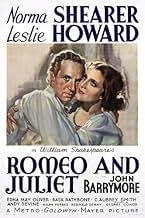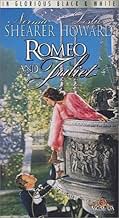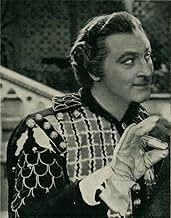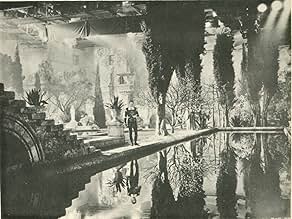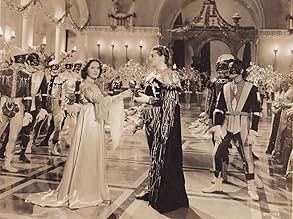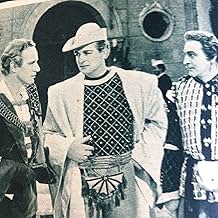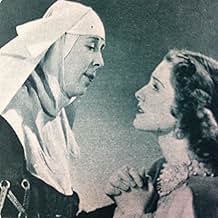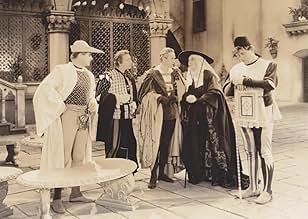IMDb-BEWERTUNG
6,5/10
2358
IHRE BEWERTUNG
Füge eine Handlung in deiner Sprache hinzuYoung love is poisoned by a generations long feud between two noble families.Young love is poisoned by a generations long feud between two noble families.Young love is poisoned by a generations long feud between two noble families.
- Regie
- Drehbuch
- Hauptbesetzung
- Für 4 Oscars nominiert
- 4 Gewinne & 5 Nominierungen insgesamt
Charles Bancroft
- Nobleman
- (Nicht genannt)
Dean Benton
- Minor Secondary Role
- (Nicht genannt)
Carlyle Blackwell Jr.
- Tybalt's Page
- (Nicht genannt)
John Bryan
- Friar John
- (Nicht genannt)
Empfohlene Bewertungen
This production got glitsy treatment by production head Irving G. Thalberg, who was showcasing his wife, Norma Shearer, playing Juliet: two years of research, a crew sent to Verona to photograph parts of the city; reconstruction of Verona's Church of San Zeno on the back-lot; thousands of extras; beautiful costumes and sets, etc. Although the screenplay was shortened, Thalberg also insisted that only Shakespeare's words were to be used in the dialogue. That would be a pleasure for those who knew the play, but a bane for those who didn't. Shakespeare's spoken dialogue isn't very easy to understand. Like any foreign language you learned a little bit in school, you can translate written material and get the gist of what is going on, but try deciphering normal speech in that language and you will be lost. I had a difficult time understanding some of the speeches (almost nothing that John Barrymore was saying) - they flew by me too fast. (On the other hand, I studied Hamlet and Macbeth in school and relish watching movie versions of those plays.) Still, I enjoyed this film, since I knew the general story, and there were sections that didn't tax my knowledge of Shakespearean English. Some of the lines were beautiful. I never new that the expression "star-crossed lovers" was Shakespeare's. Edna May Oliver's comedy was superbly played and the acting of the rest of the cast was excellent. The title characters were supposed to be teenagers, so that both Leslie Howard (at 54) and Norma Shearer (at 31) were a bit old for their parts, but that was a minor point. My advice to anyone wishing to watch this film: read the play first!
Despite the fact we have a 47 year old Romeo, a 36 year old Juliet, and a 54 year old Mercutio; George Cukor's production for MGM of Romeo and Juliet manages to entertain and well.
Of course these protagonists are all teenagers, but these players have all played romantic parts in an age when romance was not something to be cynical about and they do fit their roles well. No Romeo was ever more dashing than Leslie Howard or a Juliet as passionate as Norma Shearer.
John Barrymore as Mercutio is a bit of an exception. I look at him and I think of another Shakespearean character who simply doesn't want to grow up and spends his time with the young blades of his day at the tavern. That would be Falstaff in Henry IV in both parts and if you think of Barrymore's Mercutio in that way, his interpretation makes a lot of sense.
My favorite in this film has always been Tybalt and Basil Rathbone plays him with fire and passion. Rathbone got an Academy Award nomination, the first of two, for Best Supporting Actor in the first year Supporting Actor Awards were given out. He lost however to Walter Brennan in Come and Get It. He's just spoiling for a fight with some Montagues and in the end he unfortunately gets one.
Romeo and Juliet is insightful into the Italy of the times. Italy was a geographical expression not a nation. In fact it was ruled mostly by the German entity, the Holy Roman Empire. But inside the empire and out it was a succession of petty states, constantly at war with each other. Sometimes the causes of the wars were long forgotten, but the hostilities took on a life of their own.
Right down to a couple of wealthy families in the small town of Verona where the prince there has his hands full trying to keep the Montague and Capulet feud from spilling over into violence every time some of them meet in his town.
With this background a young prince of Montague just getting over another bad romance and a princess of Capulet whose father has her slated to marry another meet and fall in love. Even when they find out their respective pedigrees, it makes no difference.
In fact the idea that love can bridge all barriers is what I believe makes Romeo and Juliet as popular as it is. It's a lesson people and nations could learn.
Norma Shearer got an Oscar nomination for playing Juliet, but lost to Luise Rainer in The Great Ziegfeld as Best Actress. George Cukor and the film itself also were up, but lost for best director and best picture.
Andy Devine plays the small part of Peter, a Capulet servant and I'm sure you're wondering what Andy Devine was doing in Shakespeare. So did he when he was cast in the part. The story goes that he went to George Cukor and told him he hadn't foggiest idea what he was doing in a classic Shakespeare play, he'd never done anything like this. Cukor supposedly told him, that was to his credit and that he would be the only member of the cast who would not be telling him how to direct the film. Turned out Cukor was right, but the film got made.
And that's definitely for the better.
Of course these protagonists are all teenagers, but these players have all played romantic parts in an age when romance was not something to be cynical about and they do fit their roles well. No Romeo was ever more dashing than Leslie Howard or a Juliet as passionate as Norma Shearer.
John Barrymore as Mercutio is a bit of an exception. I look at him and I think of another Shakespearean character who simply doesn't want to grow up and spends his time with the young blades of his day at the tavern. That would be Falstaff in Henry IV in both parts and if you think of Barrymore's Mercutio in that way, his interpretation makes a lot of sense.
My favorite in this film has always been Tybalt and Basil Rathbone plays him with fire and passion. Rathbone got an Academy Award nomination, the first of two, for Best Supporting Actor in the first year Supporting Actor Awards were given out. He lost however to Walter Brennan in Come and Get It. He's just spoiling for a fight with some Montagues and in the end he unfortunately gets one.
Romeo and Juliet is insightful into the Italy of the times. Italy was a geographical expression not a nation. In fact it was ruled mostly by the German entity, the Holy Roman Empire. But inside the empire and out it was a succession of petty states, constantly at war with each other. Sometimes the causes of the wars were long forgotten, but the hostilities took on a life of their own.
Right down to a couple of wealthy families in the small town of Verona where the prince there has his hands full trying to keep the Montague and Capulet feud from spilling over into violence every time some of them meet in his town.
With this background a young prince of Montague just getting over another bad romance and a princess of Capulet whose father has her slated to marry another meet and fall in love. Even when they find out their respective pedigrees, it makes no difference.
In fact the idea that love can bridge all barriers is what I believe makes Romeo and Juliet as popular as it is. It's a lesson people and nations could learn.
Norma Shearer got an Oscar nomination for playing Juliet, but lost to Luise Rainer in The Great Ziegfeld as Best Actress. George Cukor and the film itself also were up, but lost for best director and best picture.
Andy Devine plays the small part of Peter, a Capulet servant and I'm sure you're wondering what Andy Devine was doing in Shakespeare. So did he when he was cast in the part. The story goes that he went to George Cukor and told him he hadn't foggiest idea what he was doing in a classic Shakespeare play, he'd never done anything like this. Cukor supposedly told him, that was to his credit and that he would be the only member of the cast who would not be telling him how to direct the film. Turned out Cukor was right, but the film got made.
And that's definitely for the better.
The Adrian (and Messell) costumes are magnificent. The sets & cinematography are beautifully realized & director George Cukor does the best he can with what he has been given but the absurd casting of actors 20 years, or more, too old cannot be ignored. Juliet is supposed to be around 13 & Norma Shearer is in her mid 30s. Romeo is to be approximately 16. Leslie Howard is in his mid 40s. The foolish, romantic & tragic path taken by Romeo & Juliet is because of their youth. With these 2 way too old actors, it makes the characters behave as if they are developmentally challenged. It is not how adults behave. I'm am not a student of Shakespeare but I've read the play. Many necessary cuts were made to the text in order to get it to the screen or it would've ended up being over 4 hours long. I don't complain of these cuts. I don't complain of the line readings by some actors. I respect how the studio & Thalberg put the money & attention to detail into the production. Accomplished Shakespearean acting coaches were brought in to get the best performances from the actors. I believe Norma Shearer worked hard to do her best but oh my. She is not Juliet. Leslie Howard is ok but both wouldve been better cast as Lord and Lady Montague or Lord and Lady Capulet. It is a lush & lavish production. I can admire it as a beautiful elegant bauble. If I don't pay close attention to the actors, I can enjoy the spectacle but I cannot accept Shearer & Howard as the lead characters. It's a distraction I cannot pretend isn't there. That they are too old is a valid reason to critique the movie harshly.
Unlike so many of the other commentators below, I am not a fan of Ms. Shearer. In her opening scene, she gushily keeps herself wide-eyed and smiling--all the time acting innocent, while Olivia Hussey and other screen Juliets don't have to act innocent: they are innocent.
That said, this film has much to offer, despite its lacking the passion of other more recent versions. The verse is spoken well, and Barrymore is brilliant as Mercutio. Yes, he's pure ham---but a succulent one. His Mercutio is, as the character's name implies, mercurial as well as absurdist, ironic, and virile. Rathbone is like a living rapier and gets my vote as the best Tybalt the screen has ever seen. However, don't believe producer Thalberg's ballyhoo that every word spoken in this film is from Shakespeare's play: it isn't, although it's close.
That said, this film has much to offer, despite its lacking the passion of other more recent versions. The verse is spoken well, and Barrymore is brilliant as Mercutio. Yes, he's pure ham---but a succulent one. His Mercutio is, as the character's name implies, mercurial as well as absurdist, ironic, and virile. Rathbone is like a living rapier and gets my vote as the best Tybalt the screen has ever seen. However, don't believe producer Thalberg's ballyhoo that every word spoken in this film is from Shakespeare's play: it isn't, although it's close.
Although there were a number of silent versions of Shakespeare plays, and the first direct screen adaptation of his work was in 1929 with the (incidentally very entertaining) Fairbanks/Pickford Taming of the Shrew, it wasn't until the mid-1930s that Hollywood really set its sights on the Immortal Bard. The industry had emerged triumphant from the coming of sound, the worst years Depression and the enforcement of the production code, and now was the time to scale new heights.
Now, Shakespeare was great, and 30s Hollywood was also great, but in a very different way. The two were not entirely incompatible, but there was certainly a lot of scope to get things wrong. And one of the worst things to go wrong in this particular example is casting. A year earlier Warner Brothers had thrown decorum to the winds and simply lined up their usual rogues gallery of wisecrackers for a wild and surprisingly effective edition of A Midsummer Night's Dream. MGM however seemed keener to preserve a sense of theatrical propriety and chose actors for their credentials and experience.
Experience comes with age, and that is really the biggest single problem with these two star-crossed lovers. Norma Shearer gives a powerful and emotionally realistic performance, but she has the demeanour of a woman who has seen a bit of life, as opposed to a girl embarking on her first romance. Lesley Howard would actually make quite a good Romeo, he has the right honest bearing and simple handsomeness, but really he would have to be at least ten years younger. One might argue that if their acting is strong enough, surely we can stretch the imagination a little and overlook their years. This can and does work in some pictures (for example Anne Bancroft only being a little older than Dustin Hoffman in The Graduate), but for Romeo and Juliet it essential that we get that impression of flighty, passionate young lovers whose eventual demise is a tragic waste of life.
But there is worse yet than Shearer and Howard. The very acme of bad casting is here represented by John Barrymore as Mercutio. Don't get me wrong, Barrymore is comically eccentric, but Mercutio is supposed to be a sly young rake, not some jolly middle-aged lecher. And remember the character was named after his mercurial temperament (meaning quickly changing mood), yet Barrymore is just incessantly merry. Mercutio's greatest moment – the Queen Mab speech – is reduced to a wittering ramble. Another mistake of the casting couch was Andy Devine as Peter the servant. Devine is funny, and could even have been an asset in a Shakespearean comedy, but he is not right here. There are meant to be a few laughs in Romeo and Juliet, but not from some inept twerp. His inclusion in the opening brawl (the lines he speaks here belong to another character) is ridiculous, and sets absolutely the wrong tone.
This was an Irving Thalberg production, and Thalberg was probably the finest of the old-style producers, having a real knack for putting together the right team and then graciously leaving them to it. It's unlike him to make so many blunders with principle casting, but at least he got a decent crew. George Cukor was a good choice for director, as he was already the best when it came to stage-to-screen adaptations. He fills the earliest scenes with all sorts of bustle and background movement, then makes everything simplified and stripped down as the drama intensifies, focusing everything on the performers. William Daniels's cinematography is stunning, rich in light and shadow, the standout being the dance scene in which Howard is crisply black and Shearer shimmering white, with the background figures a wash of grey. Even on the acting front it's not all bad. Edna May Oliver is spot-on as the nurse, with her almost guttural delivery complementing the character's lewdness. And Basil Rathbone gives a calm, calculated performance, keeping all Tybalt's aggression simmering below the surface.
It was around this time that Laurence Olivier claimed Shakespeare could never work on screen, saying, "The shot is too big for the cannon". Of course, he would soon swallow his words and become the foremost actor, director and producer of Bard movies. His statement was born from the snobbishness of a naïve young theatre devotee, but one can't help thinking that such lukewarm offerings as this Romeo and Juliet only served to back up his opinion.
Now, Shakespeare was great, and 30s Hollywood was also great, but in a very different way. The two were not entirely incompatible, but there was certainly a lot of scope to get things wrong. And one of the worst things to go wrong in this particular example is casting. A year earlier Warner Brothers had thrown decorum to the winds and simply lined up their usual rogues gallery of wisecrackers for a wild and surprisingly effective edition of A Midsummer Night's Dream. MGM however seemed keener to preserve a sense of theatrical propriety and chose actors for their credentials and experience.
Experience comes with age, and that is really the biggest single problem with these two star-crossed lovers. Norma Shearer gives a powerful and emotionally realistic performance, but she has the demeanour of a woman who has seen a bit of life, as opposed to a girl embarking on her first romance. Lesley Howard would actually make quite a good Romeo, he has the right honest bearing and simple handsomeness, but really he would have to be at least ten years younger. One might argue that if their acting is strong enough, surely we can stretch the imagination a little and overlook their years. This can and does work in some pictures (for example Anne Bancroft only being a little older than Dustin Hoffman in The Graduate), but for Romeo and Juliet it essential that we get that impression of flighty, passionate young lovers whose eventual demise is a tragic waste of life.
But there is worse yet than Shearer and Howard. The very acme of bad casting is here represented by John Barrymore as Mercutio. Don't get me wrong, Barrymore is comically eccentric, but Mercutio is supposed to be a sly young rake, not some jolly middle-aged lecher. And remember the character was named after his mercurial temperament (meaning quickly changing mood), yet Barrymore is just incessantly merry. Mercutio's greatest moment – the Queen Mab speech – is reduced to a wittering ramble. Another mistake of the casting couch was Andy Devine as Peter the servant. Devine is funny, and could even have been an asset in a Shakespearean comedy, but he is not right here. There are meant to be a few laughs in Romeo and Juliet, but not from some inept twerp. His inclusion in the opening brawl (the lines he speaks here belong to another character) is ridiculous, and sets absolutely the wrong tone.
This was an Irving Thalberg production, and Thalberg was probably the finest of the old-style producers, having a real knack for putting together the right team and then graciously leaving them to it. It's unlike him to make so many blunders with principle casting, but at least he got a decent crew. George Cukor was a good choice for director, as he was already the best when it came to stage-to-screen adaptations. He fills the earliest scenes with all sorts of bustle and background movement, then makes everything simplified and stripped down as the drama intensifies, focusing everything on the performers. William Daniels's cinematography is stunning, rich in light and shadow, the standout being the dance scene in which Howard is crisply black and Shearer shimmering white, with the background figures a wash of grey. Even on the acting front it's not all bad. Edna May Oliver is spot-on as the nurse, with her almost guttural delivery complementing the character's lewdness. And Basil Rathbone gives a calm, calculated performance, keeping all Tybalt's aggression simmering below the surface.
It was around this time that Laurence Olivier claimed Shakespeare could never work on screen, saying, "The shot is too big for the cannon". Of course, he would soon swallow his words and become the foremost actor, director and producer of Bard movies. His statement was born from the snobbishness of a naïve young theatre devotee, but one can't help thinking that such lukewarm offerings as this Romeo and Juliet only served to back up his opinion.
Wusstest du schon
- WissenswertesThe film contains the only on-screen sword fight that expert swordsman Basil Rathbone won in his entire film career.
- Zitate
Juliet - Daughter to Capulet: My bounty is as boundless as the sea, My love as deep. The more I give to thee, The more I have, for both are infinite.
- VerbindungenFeatured in Master Will Shakespeare (1936)
Top-Auswahl
Melde dich zum Bewerten an und greife auf die Watchlist für personalisierte Empfehlungen zu.
- How long is Romeo and Juliet?Powered by Alexa
Details
- Erscheinungsdatum
- Herkunftsland
- Offizieller Standort
- Sprache
- Auch bekannt als
- Romeo and Juliet
- Drehorte
- Produktionsfirma
- Weitere beteiligte Unternehmen bei IMDbPro anzeigen
- Laufzeit2 Stunden 5 Minuten
- Farbe
- Seitenverhältnis
- 1.37 : 1
Zu dieser Seite beitragen
Bearbeitung vorschlagen oder fehlenden Inhalt hinzufügen


